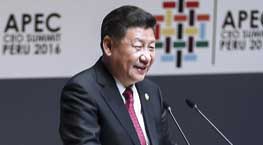RIO DE JANEIRO, Nov. 29 (Xinhua) -- Amid popular protests, the Brazilian Senate approved Tuesday a bill to limit government expenses for the next 20 years by 61 votes against 14.
The bill, a proposed constitutional amendment, still needs to be approved in a second voting and signed into law. It foresees that for the next two decades, the government expenses in Brazil will only be increased by up to the inflation rate of the previous year.
The proposal is highly controversial for several reasons: the unusual long period foreseen in the document; it only limits the expenditures of the executive, but not that of the judiciary of legislative branches, and the low spending cap itself.
Brazil is a country with an aging population, which means the need for investments in public healthcare and social security will certainly increase by more than the inflation rate in upcoming years.
The same can be said about public education, with access to college remaining low for youngsters, despite improvements in the past decade. Other sectors are notoriously underfunded, such as basic sanitation, which will also be negatively affected by the bill.
While the Senate voted the bill, protestors gathered in front of the Congress building to publicly oppose the measure and press senators into voting against it.










